- Home
- Sara Craven
The Virgin s Wedding Night Page 2
The Virgin s Wedding Night Read online
Page 2
Accustomed to London’s restrictions, she’d found Gracemead and its large grounds had provided her with a magical playground to explore for hours at a time. And Nanny and Mrs Wade had almost vied with each other to make sure she lacked for nothing to make her feel comfortable and secure.
Her relationship with her grandfather had taken rather longer to establish. He’d been awkward with her at first, taciturn and more than a little gruff. And sometimes she’d found him watching her as if he was puzzled about something. Then, one day, she’d heard one of the local ladies refer to her as ‘Poor Caroline’s little girl. You would never know, would you?’ and understood.
It was the day he’d found her in his book-lined study, deep in Black Beauty, twining a strand of hair round her finger as she read, that everything had changed between them.
She hadn’t realised immediately that she was no longer alone, and when she’d looked up and seen him watching her, she’d been apprehensive in case he was angry.
But his sudden smile had been strangely tender. ‘Your mother used to do that when she was reading,’ he told her. ‘And this was her favourite book too.’
He sat down in the big wing chair by the fireplace and began to talk to her, listening patiently to her halting replies, and encouraging her to be less shy, and say whatever was on her mind.
Looking back, Harriet could even say with honesty that she’d had a pretty good childhood in spite of her mother’s continuing and prolonged absences. There’d been postcards at first, and letters from the States, then from Europe, after the relationship with Bryn had finally crashed and burned like all the others, and Caroline had joined up with a professional tennis player, not quite in the top rank.
Eventually, as the years had passed, the letters had become fewer, then dried up altogether. At the last contact—a card for her twenty-first birthday—Caroline had seemed to be in Argentina living with a former polo player. But no address had been included, and since then there’d been nothing to indicate whether her mother was alive or dead.
Harriet had come to accept over the years that her mother lived solely on her own terms, and that the existence of her child belonged to a long-discarded past. She was left to remember only Caroline’s beauty and zest for life, however misplaced, and to try and forget the negative elements of their relationship. At the same time, however, her life with her grandfather, though never lacking in affection, grew marginally trickier.
Gregory Flint was clearly determined that Harriet was not going to follow in her mother’s footsteps if there was anything he could do to prevent it. Accordingly, Harriet found her life controlled by a kind of benevolent despotism, her freedom restricted and her judgement regularly called into question.
And the fact that she could—almost—understand why it was happening made it no less irksome.
The first major clash between them had come when she was eighteen, and had just left her convent school, and he’d announced he’d found her a place in a Swiss establishment where she would improve her foreign language skills, and embark on a cordon bleu cookery course.
She’d stared at him open-mouthed. ‘You mean I’m going to be finished? Gramps, you can’t mean it. Anyone would think we were living a hundred years ago.’
His brows snapped together. ‘You have some other idea?’
‘Well, of course.’ She tried her most winning smile. ‘I’ve decided to join the family business. Carry on the Flint name for another generation.’
‘You—want to work for Flint Audley?’ He gave a harsh laugh. ‘And where did this ridiculous notion spring from, I wonder?’
‘It seems an obvious choice,’ she countered.
‘Well, it’s not obvious to me,’ he said scathingly. ‘What on earth do you think you know about property management on the scale we deal with? Dealing with our range of tenants, contracts, maintenance—the thousand and one issues you’d be faced with? You—a chit of a girl just out of school?’
‘I’d know about as much as you and Gordon Audley did when you started out in the fifties.’ Harriet lifted her chin without flinching. ‘And certainly as much as Jonathan Audley with his 2:2 in Fine Arts,’ she added, her tone edged. ‘Yet he seems to have been welcomed with open arms—even by you. I could run rings round him, given the chance.’
She paused. ‘Because I’m not just “a chit of a girl” as you claim. I’m a chip off the old block, and all I want is an opportunity to prove myself.’ She added more quietly. ‘I—I thought you’d be pleased.’
‘Then you can think again, and quickly too.’ His voice was cutting. ‘I have very different plans for your future, my girl.’
‘Yes, I know. Polite French conversation halfway up some Alp.’ She shook her head. ‘Gramps, darling, it would never work. I’d be so bored. And you know what they say about idle hands,’ she added unthinkingly, and saw his face harden into real anger.
‘Is that a reference to your mother?’
She bit her lip. ‘No, I promise it’s not.’ Although maybe things might have turned out differently for her if she’d been allowed to have a real job—a career from the outset—instead of being expected to stay at home, the dutiful daughter. Perhaps that original love affair was her first chance to be herself. To make a choice, even if it was the wrong one…
She thought it, but did not say it. Instead, she went on coaxingly, ‘All the same, I’d like to pass on the social graces, and start earning my living like everyone else I know.’
There was a silence, then he said, ‘Well, there’s no need to be in too much of a hurry to decide about the future. Why not take one of those gap years, and spend some time at home, while you make up your mind? If you need an occupation, there’s always plenty of voluntary work about.’
‘Gramps, my mind is made up.’ She took a deep breath. ‘And Larry Brotherton is interviewing me for a job as an assistant in the rents review department on Monday.’
‘No one,’ her grandfather said ominously, ‘has seen fit to mention this to me. And I am still nominally supposed to be the chairman of the board.’
‘With your mind, presumably, on higher things than the recruitment of very junior staff.’ She shrugged. ‘Anyway, Mr Brotherton may turn me down.’
‘I doubt that very much.’ He was silent for a moment, then grunted. ‘I suppose if you’re determined I can’t stop you. And Flint Audley will do as well as anywhere—until, of course, you’re ready to settle down.’
And I laughed, and said, ‘Of course,’ thought Harriet.
She’d been too pleased with her victory to consider the clear implication in his words. That working at Flint Audley would be merely a stop-gap arrangement until she fulfilled her female destiny by making a sensible marriage.
And when, to her delight, she’d been offered the job, she’d thrown herself into it, working so conspicuously hard that promotion had soon followed. Now, six years later, driven by ambition and hard graft, she was at management level, with a salary to match, a generous bonus, and a possible brief to expand the commercial management branch of the company outside London.
That was if the afternoon’s meeting went her way, as she was determined that it should.
Her colleagues might not like her particularly—she knew that behind her back she was called ‘Harriet the Harridan’—but they couldn’t knock her achievements, and that was what she cared about.
If only Gramps could have been equally satisfied, she thought bitterly. But there’d never been any chance of that. His opinion of her career had remained totally unchanged—that it was simply a way of keeping busy until real life intervened, and she found herself a suitable man.
But over the past year his attitude had hardened to the point of disaster.
‘Gracemead is a house for a family, not a single woman,’ he’d growled. ‘You’ve wasted enough time, my girl. Find yourself a decent man and bring him home as your husband, or I’ll change my will. Arrange for the place to be sold after I’m gone.’
She
’d stared at him open-mouthed. ‘Gramps—you’re not serious. You can’t be.’
‘I mean every word,’ he’d returned ominously. ‘I’m going to set you a deadline, Harriet. If you’re not engaged, or better still married, by your next birthday, I shall contact my lawyers. As my heiress, you’d be vulnerable—prey to any smooth-talking crook who came along. I intend to see you with a strong man at your side.’
‘I don’t believe this.’ She’d been breathless with shock and anger. ‘That kind of thinking belongs in the Ark.’
He’d nodded grimly. ‘And everything in the Ark went in two by two—exactly as nature intended. And if you want this house, you’ll do the same.’
Remembering, Harriet caught a glimpse of herself in a shop window, scowling ferociously, and hastily rearranged her expression into more agreeable lines. She made it a strict rule never to take any personal problems into the office, so no one knew about the rock and the hard place currently confronting her in her private life.
‘And they’re not going to know, either,’ she muttered under her breath. This afternoon she had to make a conscious effort to win hearts and minds for her expansion programme, and she already knew that her plans would be under attack by Jonathan Audley, just for the sake of it.
He’d been furious when she’d first overtaken him in the promotion stakes, and she knew she had him to thank for her less than flattering nickname.
But then he’s never heard what I call him under my breath, she thought.
All the same, there were times when she wanted to take hold of him by his pure silk designer tie, and say, Look, we’re on the same side, you pathetic idiot. Stop being a total obstruction.
But it wasn’t just office politics. Harriet knew that she’d offended Jonathan’s male ego long ago, by signally failing to appreciate the charms that had set the young secretaries in a dither since he’d joined the company.
Too pleased with himself by half had been her original thinking, and she’d seen no reason to alter her opinion since. Except, maybe, to add ‘bloody nuisance’ to his list of failings.
And today, unfortunately, she would need every scrap of patience she possessed in order to deal with him.
As she rounded the corner into the square where Flint Audley’s offices were located, she saw that a group of people had gathered outside the small railed garden opposite the building, and were watching something intently.
Curious, Harriet slowed a little, wondering what had attracted their attention. If there’d been some kind of accident, which might require emergency action.
Then, as realisation dawned, her brows snapped together. Good God, she thought. It’s the guy from the restaurant—the alley-cat artist.
Sitting sideways on the low wall, one long leg tucked under him and a board balanced on his lap, he was sketching rapidly.
As Harriet watched, he tore off the sheet of paper he’d been working on, and handed it with a bow to the girl directly in front of him, amid laughter and applause from the others standing around.
Not just vaguely sinister Mediterranean scenes, this time around, but instant portraits, it seemed. Was this the other—different—work that Luigi had mentioned? She was aware of an odd disappointment as the subject of the sketch blushed, giggled, then bent, a little awkwardly, to put some money in the box at his feet.
Well, that certainly confirmed what Luigi had also said about him being hard up, she thought.
Not that she could allow it to make a difference.
The square was a pretty exclusive location, and besides, he probably needed a licence for what he was doing, and she’d bet good money he didn’t have one.
And then, just as if he’d picked up her thought-waves across the width of the road, he looked at her, the dark brows lifting in recognition. Only this time he didn’t look away, subjecting her to a long, searching look that rested on her face, then travelled with lingering arrogance the entire length of her body, as if he was asking some silent question.
There was something in his gaze that caught Harriet completely on the raw, prompting—and deepening—the feelings of self-consciousness she’d experienced at their earlier encounter. Something which she could not understand, and certainly didn’t appreciate.
You’re one step away from down-and-out, my friend, she addressed him silently. So, talented or not, you’re in no real position to issue any kind of challenge, as you’re about to find out.
She turned and swept into the building.
‘Les,’ she said to the security man behind the reception desk. ‘Get that person across the road to move on, will you?’ She forced a smile. ‘He’s making the place look untidy.’
He gave her a surprised look. ‘Not doing any real harm is he, miss?’
‘Apart from causing an obstruction,’ Harriet said crisply. ‘Anyway, I’d prefer not to discuss it.’
She walked to the lift, aware that a cloud of disapproval was following her.
But I can’t afford to care about that now, she told herself, as she rode upwards. So, Luigi’s tame artist can just push off and struggle somewhere else. And good riddance to him.
And, gritting her teeth, she marched out of the lift, off to do battle over something that really mattered.
CHAPTER TWO
‘W ELL , you were a great deal of help,’ Tony Morton, Harriet’s immediate boss commented sourly as they left the meeting. ‘What the hell was wrong with you? This expansion on the commercial side is supposed to be your pet project, and yet half the time you seemed to be in a trance.’
He gave her a frowning look. ‘So, what is it? Have you fallen in love?’
Harriet gasped. ‘No,’ she said. ‘No, of course not.’
‘Well, something must be going on,’ he said moodily. He threw his arms in the air. ‘My God, when you were talking about that development site in the Midlands, you actually said “beachside” instead of “canalside”. What was that about?’
‘I was probably thinking of the canal’s leisure and holiday opportunities,’ was the only lame excuse Harriet could come up with on the spur of the moment. ‘It was a slip of the tongue,’ she added, cursing under her breath.
A Freudian slip, more like, she admitted silently. It had been hot in the boardroom, and that damned picture from the restaurant had kept coming back into her mind. For a moment there she’d imagined she actually felt the relentless beat of the sun, and the burn of the sand under her bare feet. But that wasn’t all.
For some unfathomable reason, the man Roan’s dark face had suddenly intruded into her consciousness too, the shadowed eyes glinting as if in mockery. Or even, she thought, scorn.
And that was the moment she’d found herself floundering…
Which was, she told herself, totally absurd.
‘Well, you can’t afford any more of these slips.’ Tony shook his head. ‘Now we have a three-month delay while we prepare yet another report. The whole scheme has lost whatever priority status it had. Unbelievable.’
Harriet bit her lip. ‘Tony, I’m really sorry. Naturally, I realised it wasn’t going to be a walkover, but it isn’t a total defeat either.’
‘We were let off the hook, sweetheart,’ he reminded her grimly. ‘I only hope that next time you’ll have got your beans in a row as efficiently as Jonathan marshalled the opposition today.’
Well, she couldn’t argue about that, Harriet thought, mortified. She’d been well and truly ambushed. She’d expected the usual clash of horns, and encountered instead a ‘more in sorrow than in anger’ routine from Jonathan, which accused her elliptically of trying to split the company and establish her own independent business empire.
Caught on the back foot, she’d rallied and offered a vehement denial, but not quickly enough, and she could tell that the seed had been sown in the minds around the table, and that alarm bells were ringing.
And while Flint Audley commanded her total loyalty, she had to admit the chance of escaping from the hothouse politicking of the London offi
ce for a while had seemed deeply attractive.
‘It would also be a good thing,’ Tony said, pausing with a frown in the doorway of his office, ‘if you’d resolve this ridiculous feud with Jon Audley. It’s doing no good at all.’
Harriet gasped. ‘You’re blaming me for it?’
‘Not blaming,’ he said. ‘Just noting that he seems to command more support round here than you do at the moment. And today he sounded like the voice of sweet reason, not you.’ He paused. ‘Maybe you should bear that in mind when you’re preparing your analysis of what went wrong earlier. I’d like it on my desk tomorrow.’
Going into her own room, Harriet managed to resist the temptation to slam the door hard.
Tony’s last comments might be unfair, she thought furiously, but there was little she could say in her own defence about the way things had gone. She had not given the job in hand her usual unflinching concentration, and she knew it. What she could not explain to herself was—why?
Because it wasn’t just the commercial project that was slipping away from her, but her entire life. And somehow she had to get it back. All of it.
She took a step towards her desk, then stopped. Oh, to hell with it, she thought impatiently, glancing at her watch. Pointless to imagine I can achieve anything useful for the rest of the afternoon, when my mind’s flying off in all directions like this. Besides, I was in before eight this morning. I’m going home.
It occurred to her that, apart from anything else, she was hungry. A shower and a meal might make her feel more inclined to reprise the events of the meeting, and pinpoint what positive aspects there’d been.
At the moment, she couldn’t think of any, but she would never admit as much. This is just a glitch, she told herself firmly. I’ll bounce back. If only I didn’t have so much else on my plate.
She squared her shoulders, then picked up her bag, and the shoulder case with her laptop, and headed for the door.
She was halfway down the corridor when she heard a burst of laughter coming from the office she was approaching, and recognised Jonathan’s voice.

 The Marchese's Love-Child (The Italian Husbands)
The Marchese's Love-Child (The Italian Husbands) Inherited By Her Enemy (HQR Presents)
Inherited By Her Enemy (HQR Presents) His Wedding-Night Heir (Wedlocked!)
His Wedding-Night Heir (Wedlocked!) The Token Wife
The Token Wife Mistress on Loan
Mistress on Loan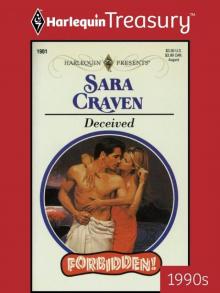 Deceived (Harlequin Presents)
Deceived (Harlequin Presents)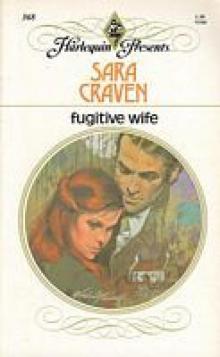 Fugitive Wife
Fugitive Wife Desperate Measures
Desperate Measures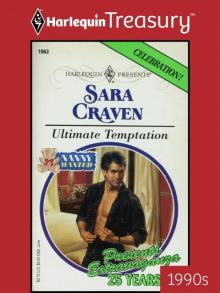 Ultimate Temptation (Harlequin Presents)
Ultimate Temptation (Harlequin Presents) The Highest Stakes of All
The Highest Stakes of All Ruthless Awakening
Ruthless Awakening Rome's Revenge
Rome's Revenge Forced Bride
Forced Bride Summer of the Raven
Summer of the Raven Smokescreen Marriage
Smokescreen Marriage The Innocent's Shameful Secret
The Innocent's Shameful Secret Marriage by Deception
Marriage by Deception The Virgin s Wedding Night
The Virgin s Wedding Night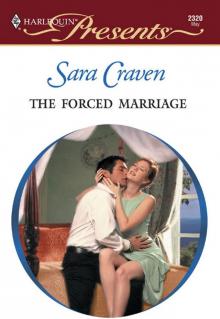 The Forced Marriage (Italian Husbands)
The Forced Marriage (Italian Husbands) The Innocent's Sinful Craving
The Innocent's Sinful Craving Inherited by Her Enemy
Inherited by Her Enemy Wife in the Shadows
Wife in the Shadows The Innocent's Surrender
The Innocent's Surrender Storm Force
Storm Force The Seduction Game (Harlequin Presents)
The Seduction Game (Harlequin Presents) The Santangeli Marriage
The Santangeli Marriage In the Millionaire's Possession
In the Millionaire's Possession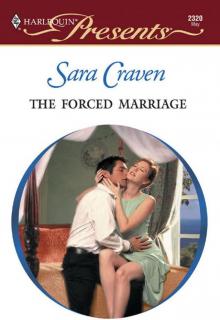 The Forced Marriage
The Forced Marriage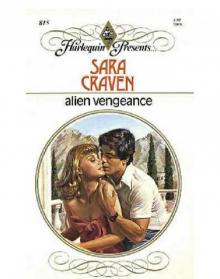 Alien Vengeance
Alien Vengeance A Nanny for Christmas
A Nanny for Christmas His Reluctant Bride
His Reluctant Bride Heart of a Hero
Heart of a Hero The Price of Retribution
The Price of Retribution Irresistible Temptation
Irresistible Temptation Dark Apollo
Dark Apollo Marriage at a Distance (Presents, 2093)
Marriage at a Distance (Presents, 2093) Count Valieri's Prisoner
Count Valieri's Prisoner The Innocent's One-Night Confession
The Innocent's One-Night Confession Bartaldi's Bride
Bartaldi's Bride His Untamed Innocent
His Untamed Innocent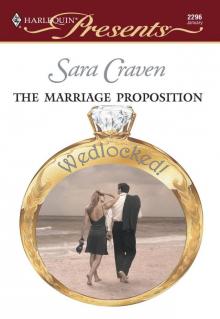 The Marriage Proposition
The Marriage Proposition The Right Bride?
The Right Bride? The End of her Innocence
The End of her Innocence